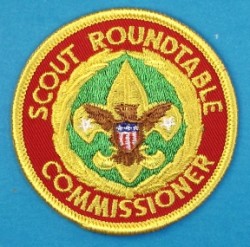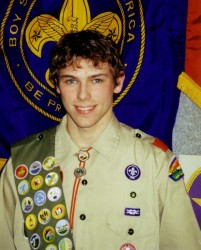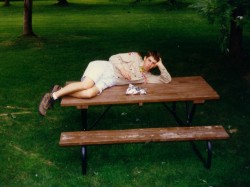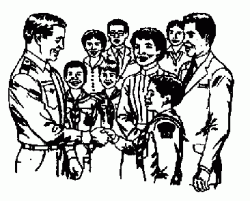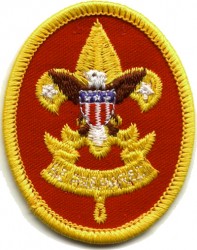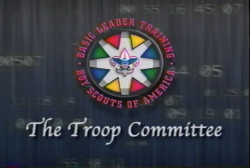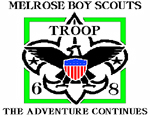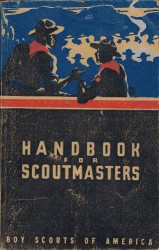 The Boy Scouts of America’s website states this about the the Aims of Scouting: The purpose of the Boy Scouts of America — incorporated on Feb. 8, 1910, and chartered by Congress in 1916 — is to provide an educational program for boys and young adults to build character, to train in the responsibilities of participating citizenship, and to develop personal fitness.
The Boy Scouts of America’s website states this about the the Aims of Scouting: The purpose of the Boy Scouts of America — incorporated on Feb. 8, 1910, and chartered by Congress in 1916 — is to provide an educational program for boys and young adults to build character, to train in the responsibilities of participating citizenship, and to develop personal fitness.
Character, citizenship, and personal fitness. Those are three outstanding goals to teach our young men. The site lists the methods, or building blocks of Scouting, as nine points: Advancement, Community Organizations and Scouting Councils, Personal Growth, Leadership, the Order of the Arrow, the Outdoors, the Patrol Method, Scouting Values, and Scouts with Special Needs. (See http://www.scouting.org/scoutsource/BoyScouts/TheBuildingBlocksofScouting.aspx )
While the main goals of Scouting have stayed the same through the decades there have been changes in the way the B.S.A. has stated these aims and methods. I decided to pull down a couple versions of the Scoutmaster Handbook from my collection to read what they say about these subjects, and see what, if any, differences there are between then and now.
First, let’s look back to the 1990 version of The Scoutmaster Handbook.
The Aims of Scouting are listed on page 69. They are:
Aim 1 – To build character.
Aim 2 – To foster citizenship.
Aim 3 – To develop fitness.
The book goes on to explain character on page 70.
It’s a “complex of mental and ethical traits”, says one dictionary. It’s “moral or ethical quality” says another. It’s qualities of honesty, courage, and integrity”, says a third. To these perfectly good descriptions we add four “self” qualities that Scouting, over the years, has been especially successful in developing in boys, self-reliance, self-discipline, self-confidence, and self-respect. When a boy begins to develop these, he begins to develop character.
This book says about citizenship: The wise Scoutmaster can guide his Scouts not only to love their country, but to understand it, know more about its heritage and history, encounter the democracy that knits together its many cultures into a nation that welcomes them all. And thus find joy in serving it.It is growth in your Scouts to that level of citizenship in which you, as Scoutmaster, will find your joy.
The book says about Aim 3, developing fitness – The third aim, developing fitness, covers a broader territory, for Scouting recognizes four areas of fitness: physical, mental, emotional, and moral. I sometimes see today’s Scout leaders emphasizing the physical fitness and forgetting about the other three, which is a shame.
That 1990 version of the handbook lists the eight (yes, eight) Methods of Scouting as: Ideals, Patrols, Outdoors, Advancement, Personal Growth, Adult Association, Leadership development, and Uniform. These were the methods I based my 30 years of scoutmastership upon. This list is a bit different then found on today’s website. I have a question for the national office. When was Adult Association dropped from the list? When did the Order of the Arrow make this list?
I also own a 1947 printing of the Handbook For Scoutmasters. Things are written a bit differently in that version. On page 10, right at the begining of the book, it states: THE AIM OF SCOUTING.
Scouting trains for citizenship by inculcating in the boy, from within instead of from without, the qualities of Character, Health and Strength, Handcraft and Skill, Service to Others.
That is somewhat different than how the aims are listed today. Some of it still exists today using different language but I find it interesting that Handcraft and Skill has been dropped. I had to look up the word inculcating because I have never seen it used before. It means: Instill (an attitude, idea, or habit) by persistent instruction.
Also on page 10 the 1947 handbook talks about the Methods of Scouting. Scouting is game played by boys in boy gangs under boy leaders chosen by the gang, guided by a man backed by other men of the community. Scouting provides the boy with an active outdoor life, grants him recognition for mastering various skills, and gives him a chance to wear an attractive uniform. It holds before him the ideals of a true Scout, and encourages him to “help other people at all times”.
The Scout Way – 1) A Game, not a Science.
Patrol Method – 2) The Scout Patrol, 3) Boy Leadership
Men In Scouting – 4) The Scoutmaster, 5) Troop committee and local Council Scouters
Activities – 6) Adventure in the out-of-doors, 7) Scout Advancement
Uniform – 8) The Scout Uniform
Ideals and Service – 9) The Scout Law, 10) The Scout Oath, or Promise – Service: Good Turns.
I love looking at the old literature and seeing how differently things were written back then. Of course, the biggest difference between Scouting in the 1940’s and today’s Scouting is that women can now serve as scoutmasters and other adult leadership positions. Back then they wrote “out-of-doors” instead of outdoors. Patrols are not called gangs in Scouting these days. I also like they way that Scouts have a chance to wear an attractive uniform. Have you seen the uniforms from the 1940’s?
This article is not meant as rant or a statement about Scouting as it is today. It is meant to show the differences in the way Scouting language has changed through the decades. I would challenge you to find some old handbooks and read them and see for yourself the way it has changed over its 100 year history. Or is it still the same?
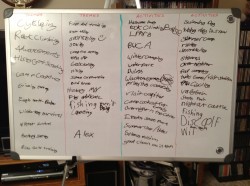 I became a scoutmaster in 1981. I went to district and council training and learned that the Boy Scouts should do the planning for their troop’s program.Boy Scout Troop 68 began holding a yearly planning conference during the first or second weekend of August. During the last thirty years it has been fun assisting the troop’s junior leaders develop their monthly themes and activities. Some activities became yearly traditions. Others did not go very well and were not repeated.
I became a scoutmaster in 1981. I went to district and council training and learned that the Boy Scouts should do the planning for their troop’s program.Boy Scout Troop 68 began holding a yearly planning conference during the first or second weekend of August. During the last thirty years it has been fun assisting the troop’s junior leaders develop their monthly themes and activities. Some activities became yearly traditions. Others did not go very well and were not repeated.